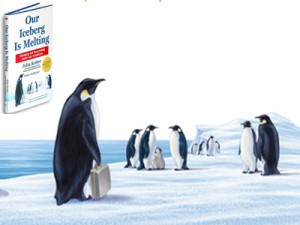By Randall Smith
When you think of a holiday present for your favorite business journalist, here’s a reading recommendation: ‘Our Iceberg is Melting’ by John Kotter, the Harvard professor who is an expert in transformational change.
Look around. Blockbuster, Borders and Eastman Kodak are companies that are in the middle of survival battles because they’ve either not been innovative or have failed to recognize the change around them. Of course, there’s the news media, which until recently had been reluctant to invest in research and development.
Change is happening at a record pace, whether in the automobile industry or the field of medicine or the mobile phone business. The key is whether we can see change or whether we’re unable to see it because we’re so focused on the ground-level action.
Kotter’s book has been out for a few years, but I know only a few business journalists who’ve read it.
Tom Curley, who is the CEO of The Associated Press, liked it so much that he asked Kotter to come to New York to talk to employees. At a recent American Press Institute seminar, one senior news executive told me that Kotter’s book was the single most important influence on his career.
One key reason is digestible writing. Kotter and co-author, Holger Rathgeber, take everything that Kotter has learned in a lifetime of pioneering research and tell it to us in the form of a fable. An important reason, Kotter says, is that we tend to remember storytelling far better than facts and figures. The book is also short, a two-hour read at most.
Fred, our hero
The hero is penguin named Fred. He’s not a member of the penguin city council or the penguin country club or any of the other prestigious organizations on the iceberg.
But Fred is a curious observer. While swimming around the island, he notices that it is shrinking and developing large cracks. Giant caverns have been carved out of the underbelly of the ice, where water will flow in during the winter, expand and break apart the penguin’s home in the darkest part of the year.
The question, of course, is what to do about it. Fred is not an influential fellow, but he recognizes that his world is about to end if he does nothing.
Lessons about change
Kotter’s story is told around eight lessons about change. The first is to create a sense of urgency and the last is the importance of creating a new culture. In between, there is a significant process, and I want to point out two of them that are particularly important to business journalists.
The first is to learn from others in similar but different businesses. In Kotter’s story, the penguins learn a great deal by talking to the seagulls. They are birds, too, obviously, but they live their lives with a completely different outlook on the future.
Imagine that you are covering Blockbuster in 2002 when their profits were arcing high in the sky. They offered variety, but the company was charging ridiculous prices to rent movies, and you had to get in your car to rent them. And there was this little competitor named Netflix on the horizon.
Looking back, few saw the Blockbuster business model as one in jeopardy. But if you looked at what customers were saying and how movies were being distributed overseas, then you’d see the reasons for alarm bells. In other words, check out what other birds are doing.
And that leads to the second point. Without agents for change in top leadership positions within a company, there’s every reason to believe that a company is doomed. In other words, there has to be someone inside who has both the CEO’s ear and is listening to employees like Fred.
Needed: Major push for new ideas
New and innovative ideas must have a pathway forward. Otherwise, there will be great difficulty in creating a sense of urgency, and employees like Fred will become discouraged and quit.
Let’s move a little closer to home. Those of us who produce content will see a number of innovations soon. The most advertised is the pay wall, which The New York Times will unveil early in 2011.
Less advertised is the content management systems announced separately by the Associated Press and the Washington Post. They will aggregate content from a number of sources and then charge businesses and perhaps consumers for content. Much of the money will hopefully help content providers. But will the money come fast enough?
What is lacking, though, is a major push for new products and revenue streams, particularly in the areas where premium content is now already protected: web and phone applications, and the new Internet possibilities for television as demonstrated by Netflix.
Change is difficult in an industry that’s been used to making money in the same fashion for over 100 years.
As we face another gloomy economic year, the survivors will be those who can see the coming transformational changes and lead in smart ways. Brighten your holiday by reading Kotter’s book more than one time. It’ll change the way you think and report about companies in the future.
Randall Smith is the Reynolds Endowed Chair in Business Journalism at the University of Missouri School of Journalism in Columbia.











